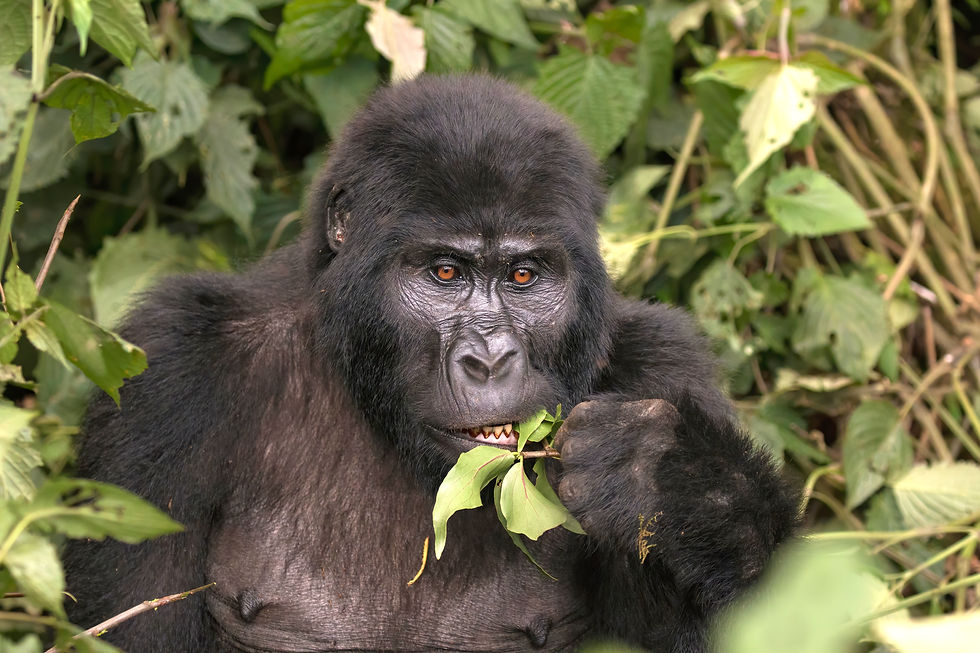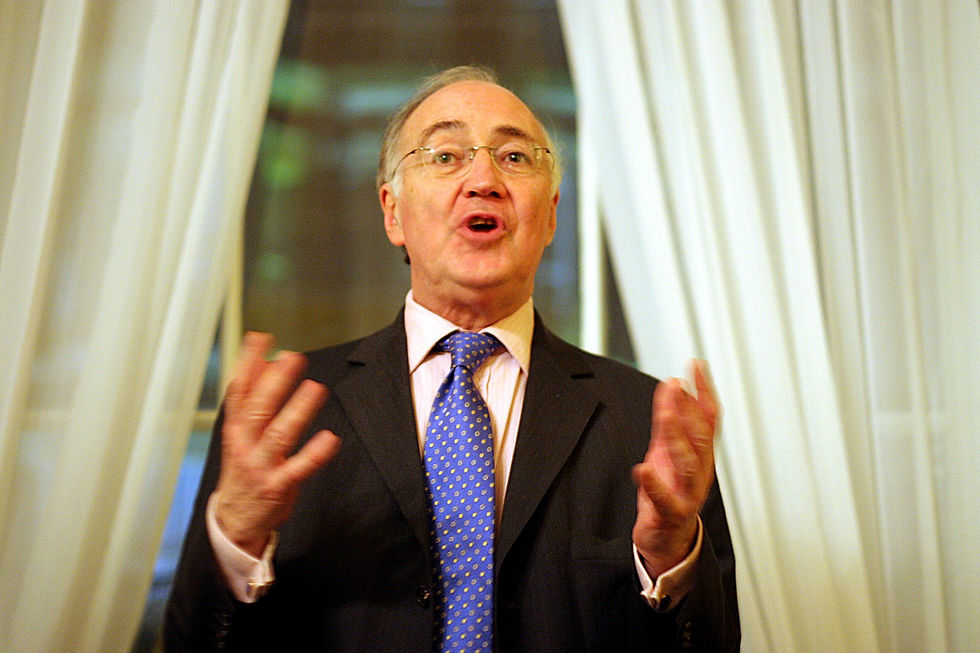Tony Blair, Antisocial Behaviour, and a Mountain Gorilla
- EPOCH

- Aug 31, 2022
- 6 min read
Will Garbett | Lancaster University
How ought we to live?
The thoughtful reader may have reflected on this question. Certainly, by the summer of 1994, David had.
Listening to 1FM – now BBC Radio 1 – on a Wednesday evening, perhaps while driving his car or weeding his garden, David overhead the opportunity to phone in and give his views on ‘Animals and Justice’. He tried his luck. By 9.30 pm, he had been passed to a slightly obnoxious presenter, Peter Hamill, who asked him what sort of mountain gorilla behaviour he would like to see in a courtroom. Instantly, David had a response.
Presenter: What sorts of mountain gorilla behaviour would you like to see brought into a courtroom?
David: Oh, the aspect of intolerance of antisocial behaviour.
Presenter: That intolerance expressed by facial expression?
David: Yes, there's other physical posturing, and of course the aggressive pose. The attempted broadening of the shoulders.
Presenter: Flaring of nostrils?
David: Yes, as if to infer some imminent physical violence.
David put forward that mountain gorillas were intolerant of antisocial behaviour. He thought this intolerance could obviously be seen in their physical behaviour – the ‘attempted broadening of the shoulders’ and the ‘flaring of nostrils’ – ‘as if to infer some imminent physical violence’. The gorillas were onto something, and David wanted this intolerance of antisocial behaviour introduced in British courts.
The phone-in was, unfortunately for David, a sting. Peter Hamill was not a real person; he was one of the many monikers adopted by the satirist Chris Morris. The ‘Call 1FM’ segment David had participated in was part of the Chris Morris Music Show, a radio satire that ran on Wednesday evenings in the second half of 1994. Thankfully, some good has come of poor David’s naivety; this interview – as disingenuous as it was – reveals much about attitudes to nature, crime, and justice in Britain thirty years ago. This exchange also helpfully demonstrates the role of satire in bringing some of these attitudes to light.
Ethics
Though the details of the justice system that David proposed were unusual, his search for justice in nature was not. Presumably, humans have always been able to see themselves in relation to the natural world, but for two thousand years different strands of Aristotelian thought have particularly informed both ethical and scientific theories.

Aristotle’s conception of the soul as the potential for a thing’s development, what the Stanford Encyclopaedia of Philosophy describes as a ‘blueprint’, entailed claims about how creatures ought to develop, both physically and ethically. This conception made its way into pre-genetic theories of taxonomical classification. In other words, body and behaviour have been used in criteria that both distinguish humans from other species and relate humans to other animals.
When David explains that he perceives gorillas to be intolerant of antisocial behaviour, he implies that tolerance is an essential trait not only in humans, but also in gorillas. A sense of tolerance is essential to being human, but not enough to identify humans as unique. Here we see a basis for perceived behavioural similarities, which allows David to look to gorillas for ethical inspiration.
We can also see reflected in David’s words the idea that behaviour in the natural world is closer to the way humans ought to be than human behaviour in modern conditions. This is not far from the appeal to nature: the proposition that because things are natural, they are good. Perhaps the influence of Eden, from Abrahamic religions, is also visible here – we were once closer to nature, and better behaved. The physiological similarity between humans and gorillas, and our relatively recent common hominine ancestor, makes this idolisation of a distant, more truthful, and more natural, past particularly easy.
In a few sentences, David brings to light millennia of philosophical traditions that were still alive and well in Britain in 1994. It was people who thought like David, and who were enmeshed in these traditions, that the Labour Party of John Smith and Tony Blair were trying to win over in the nineties.
Tough on Crime, Tough on the Causes of Crime

During his time as Shadow Home Secretary (1992 - 1994), Blair had repeatedly promised that a future Labour government would be ‘Tough on crime, tough on the causes of crime’. The phrase seems to have first appeared in an article for the New Statesman in January 1993, and was used in media appearances throughout the year, as well as a speech Blair delivered at the 1993 Labour Party Conference. In the spring before David’s phone-in, Labour had abstained from the vote on the Criminal Justice and Public Order Act 1994, essentially allowing the bill – that aimed to clamp down on antisocial behaviour – through parliament unopposed. If David was keeping up with current affairs, he would have noticed that Labour had pivoted to the right on issues of crime and punishment.
The historian of contemporary Britain, Alwyn Turner, has described the resulting verbal arms race between Labour and the Conservatives. The two parties competed to be the toughest on crime, so as to win the hearts and votes of people like David. Incoming Home Secretary Michael Howard declared at the 1993 Conservative Party Conference that ‘The balance in the criminal justice system has been tilted too far in favour of the criminal’, and earnestly began working under a new slogan: ‘Prison works’.Howard began reversing the recent decline in the

numbers of people in prison, and by the end of the decade the number of people in prison had increased by one third. The majority of new prisoners were serving sentences of six months or less, or were young offenders. These were the offenders exhibiting the antisocial behaviour that David envisioned gorilla-like intolerance for. The escalation did not end when Blair appointed Jack Straw as his Shadow Home Secretary in 1994. Straw attacked what he understood as low-level crime and antisocial behaviour, singling out graffiti, homelessness, and door-to-door sales in a 1995 speech. Prime Minister John Major had made a similar speech the year before, calling for £1,000 fines for begging. Turner argues this arms race was an importation of ‘zero-tolerance policing’ from the United States. David was not merely living in Britain, but in an ever-homogenising American world.
Other highly visible changes in the criminal justice system around this time may also have played into David’s thoughts when he asked our courts to better intimidate defendants. The terminological change from Metropolitan Police Force to Metropolitan Police Service in 1989 (famously joked about in the 2007 police-spoof film Hot Fuzz) may have been a change in the world of symbols that signified to David that the police were not doing their job, as he saw it: their name lost the inference of ‘immediate physical violence’.
David’s perception that something ought to be done about criminal justice may also have been fuelled by the crime statistics of the mid-1990s. In 1995, the year after David’s conversation with Chris Morris, the British Crime Survey estimated there were nineteen million crimes in England, while the police reported only five million. Regardless of how much crime was really happening – something quite difficult to quantify – any comparison that David made between the two figures would probably reinforce his belief that British justice had become too lenient.
Despite the attention that people like David received from politicians and satirists, his dreams of a more physically intimidating justice system never came to fruition. New Labour would go on being ‘tough on crime, tough on the causes of crime’ long after the party had defeated the Conservatives in the 1997 election, though not in quite the way David probably had

in mind. The Criminal Justice Act 2003 emphasised considerations of public safety in the justice system, introducing indeterminate prison sentences to be served until the convicted were judged to be no longer a risk to the public. This risk-averse legislation was probably the opposite of the aggression that the gorillas symbolised for David.
Perhaps pranks, like that which Morris has played on David, would be among the antisocial behaviours that would be taken more seriously in David’s ideal world. After all, the interview is probably unfair: the two are speaking at cross purposes, but only the interviewer knows it. It is painful when someone is being made fun of – especially when broadcasted to a national audience. But Morris’ satire is performing a useful service here, even if its means are as embarrassing as they are hilarious. He reveals much about Britain’s recent past through the lens of the kind of people David symbolises. I think this is particularly interesting feature of his satire, a medium that so often attacks those who nakedly wield political and cultural power, rather than those who enable these powers in everyday life.
Further Reading:
Alwyn Turner, A Classless Society: Britain in the 1990s (London: Aurum Press, 2014)
Human Nature, in Stanford Encyclopedia of Philosophy, https://plato.stanford.edu/entries/human-nature/
From the archive: Tony Blair is tough on crime, tough on the causes of crime, in The New Statesman, https://www.newstatesman.com/uncategorized/2015/12/archive-tony-blair-tough-crime-tough-causes-crime
The Chris Morris Music Show, BBC Radio 1, in Internet Archive, https://archive.org/details/TheChrisMorrisMusicShow
Will Garbett begins his PhD in History at Lancaster University in October 2022. He is particularly interested in satire and contemporary British history.
Twitter @will_garbett






